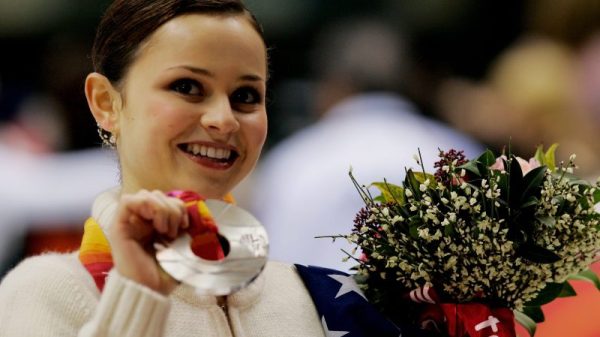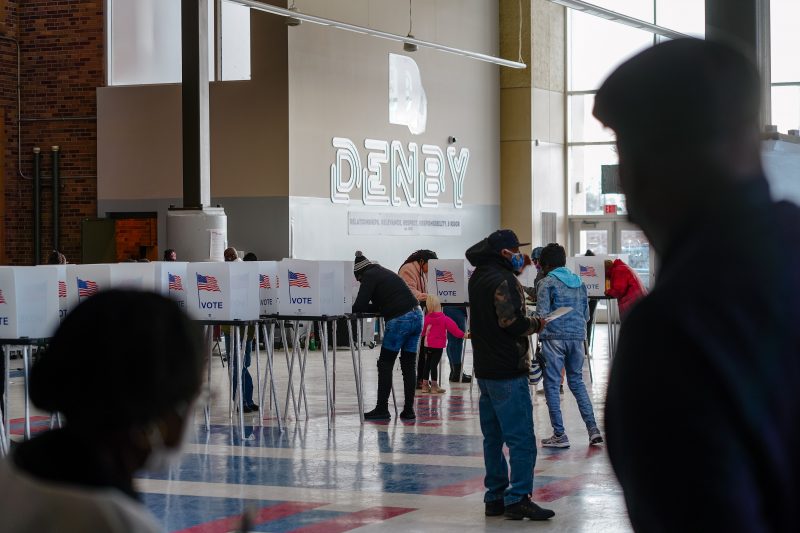As the nation prepares for the 2024 presidential election, debates over changes to voting laws have once again dominated many state legislatures.
While there are ongoing efforts to make it more difficult to vote in many Republican-controlled states, a research group found there has also been a quiet countermovement to expand access to voting across the country. A new report by the Voting Rights Lab, a nonpartisan group that focuses on analysis that advances free and fair elections, found that nearly a third of legislation passed in statehouses earlier this year make it easier to vote through policies such as expanding early- and mail voting opportunities, restoring felon voting rights and providing more time to voters for fixing errors on ballots, among other things.
The study also highlights a rising number of laws passed in the first three months of the year that add greater requirements for mail voting, disempower nonpartisan election officials and add criminal liabilities for election workers for any mistakes.
Many states have fine-tuned or drastically changed their voting laws in recent years, often in response to the coronavirus pandemic and rampant falsehoods about election systems spread by former president Donald Trump and his allies. A movement coalesced in Republican-led state legislatures to enact so-called election security measures that critics feared would restrict access to the ballot.
Following the 2020 presidential election, more than 30 states proposed and passed a flurry of laws in 2021. Nearly as many states have enacted an even greater number of changes to election policy this year, according to the report. That is despite a lower number of election bills being introduced.
The Voting Rights Lab report classified different policies as either expanding, restricting or having a neutral effect on elections. Although the group determined that a majority of new laws over the past three years will probably expand voting access, the study predicted the highest proportion yet of new laws that would restrict access.
“A lot of states are doing a lot of work to make voting more accessible for their citizens,” said Liz Avore, a policy adviser at the Voting Rights Lab and lead author of the report. “But there are a number of states that are doing the opposite. It’s increasingly the case that your Zip code determines your level of access to our democracy, which is a concerning trend we’ve seen developing.”
Some new laws, for instance, add more severe criminal punishments on “election administrators who are just doing their jobs” and may now face strict penalties for any mistakes, Avore said, while other provisions “move power away from election administrators who have traditionally run our elections over to more partisan positions.”
For example, Arkansas passed a law this year that made it a crime for election workers to send ballot applications to potential voters unless specifically requested. “Not the ballot itself, just the application,” Avore said. Mississippi criminalized the return of absentee ballots by friends and neighbors, and increased audits of local election offices. South Dakota banned the use of ballot drop boxes and increased criminal penalties for previously accepted conduct by election workers.
By contrast, Maryland and Oklahoma recently criminalized the intimidation of some voters and election officials, respectively. Minnesota enacted a voting rights package that included expansive automatic voter registration, preregistration for 16-year-old citizens and criminal bans on voter intimidation.
“There haven’t been a lot of moderate changes. It’s very polarized, either one kind or another,” said Michelle Kanter Cohen, policy director and senior counsel at the Fair Elections Center, a nonpartisan voting rights organization.
In several states, there was bipartisan support for increased avenues for citizens to register to vote and expanded options for fixing a ballot that was submitted incomplete. Other policies, like mail voting, have become highly politicized and the subject of partisan debates. Often, the communities exercising a given voting measure can define the politics surrounding the policy more than the measure’s other merits or drawbacks.
“Methods of voting or registration that are used disproportionately by communities of color and lower-income voters are often targeted by restrictions,” Kanter Cohen said. “That’s historically true and that’s still true.”
State legislators demonstrated an ability to enact laws that would improve and hamper elections in the same session, according to a Voting Rights Lab tally. Republican-led Arkansas, for instance, passed a bevy of restrictive laws, while also enacting some that the study deemed expansive. Meanwhile, Democratic-governed New Mexico enacted a sweeping voting rights package that included some policies the research group determined will have a mixed effect.
“There are very different voting cultures in different states that make it even harder to compare,” Kanter Cohen said. “You have western states, for example, that have a long history of mail elections. And you have New England states with very small jurisdictions that have more of a history of in-person voting on Election Day, where there are so few voters in a precinct that you can count all six of them at the beginning of the presidential primary. Because there can be very different cultures around voting, I think that’s one reason why it’s really important to look at how the community experience is changing in that particular state.”
The pace of change among states, coupled with a potential decline in judicial oversight of state election laws and movements to dismantle bipartisan national election cooperation efforts, reasserts states as the locus of debates over elections.
“State legislatures are making changes to the laws that impact voter access every year, and we’re seeing those changes happen around the country,” Avore said. “It’s important to pay attention to what your state legislature is doing, because most of the law that impacts your ability to vote is being made at the state level by your state legislators.”



























